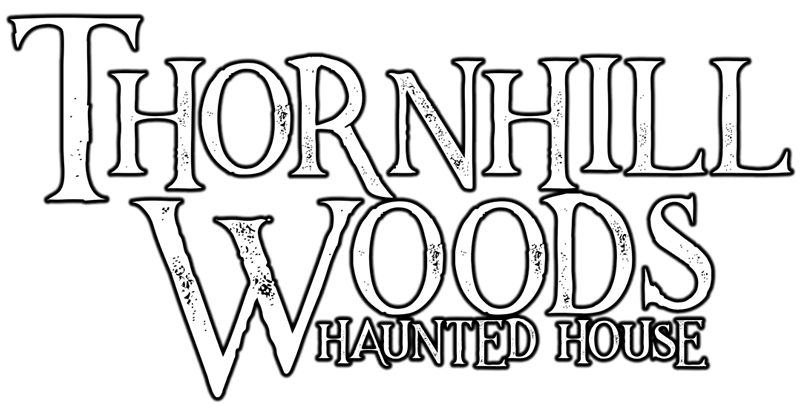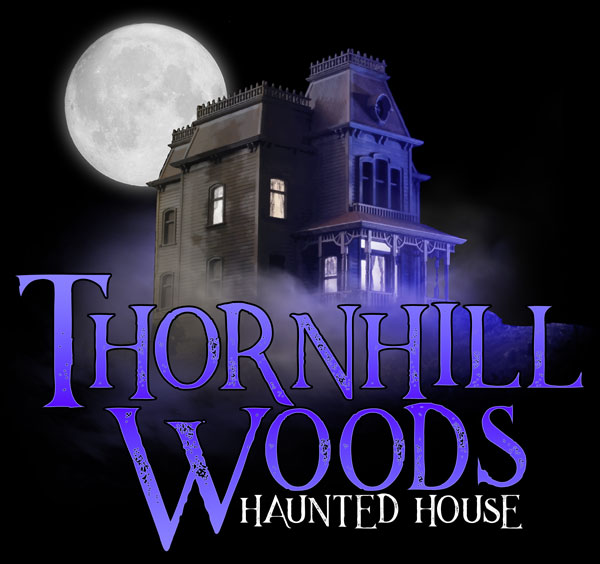LEGEND
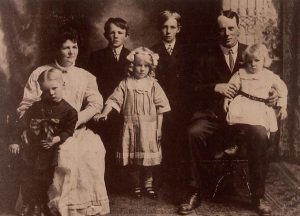 In 1902, Henry Wallace, and his family left Edinburgh, Scotland for a new life in Thornhill, Ontario, Canada. Henry had heard tales of inexpensive farm land and an abundance of work for trade’s people in the new world. He was eager to create a better life, While working in town as a carpenter, he learned of a vacant property for sale on the outskirts of town in Thornhill.
In 1902, Henry Wallace, and his family left Edinburgh, Scotland for a new life in Thornhill, Ontario, Canada. Henry had heard tales of inexpensive farm land and an abundance of work for trade’s people in the new world. He was eager to create a better life, While working in town as a carpenter, he learned of a vacant property for sale on the outskirts of town in Thornhill.
As he investigated the property, he heard the story of George Coffey who had owned the land 50 years before. George had run a small business with the Sugar Bush, tapping the trees for maple syrup and selling the sweet syrup to local businesses. His business was seasonal; maple syrup could only be collected during the cold winter months. Throughout the rest of the year, George had other work. Work no one ever discussed.
In the early 1840’s, George Coffey had been a priest in Toronto. Not content to just administer to his congregation, he began performing exorcisms. He became well known across the land, exorcizing demons from men, women and children. He chased poltergeists from homes and rid houses of unwanted spirits or ghosts.
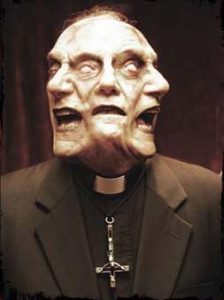 After discovering George was accepting bribes and performing spirit cleansings for all religious faiths, his church stripped him of his priestly duties and banned him from practicing.
After discovering George was accepting bribes and performing spirit cleansings for all religious faiths, his church stripped him of his priestly duties and banned him from practicing.
Disgraced, George fled from Toronto to the country. He purchased a large piece of property where he built his house. Soon, people from the local town began noticing strange occurrences and heard odd noises. On clear nights, travelers saw apparitions floating in the air. Neighbours gossiped about the great stone house. Was that demons they heard howling in the dark? And what were those bizarre symbols at the four corners of his property? Were they to keep people out or to hold some monstrous evil inside?
George continued to practice ghost hunting and made a good living, but things changed quickly when he moved to Thornhill.
Normally, when most ghosts are cleansed from a home they move on to the after life. But George did not apply the usual cleansing. He captured the ghosts, tormenting them by not allowing them the peace of the after life. Using dark magicks, he forced them to stay with him, to use their power for his own corrupt purpose.
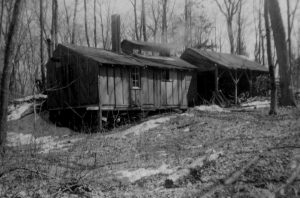 Over the years, men, women and children began to disappear from town. Many were never heard from again. The few who returned told unbelievable tales. Children spoke of being enticed onto the property by another child to come and play, men told of beautiful women beckoning them forward and women claimed handsome men bowed and urged them on. Once the person stepped into the woods on George’s property outraged ghosts attacked, bent on taking out their rage on living souls.
Over the years, men, women and children began to disappear from town. Many were never heard from again. The few who returned told unbelievable tales. Children spoke of being enticed onto the property by another child to come and play, men told of beautiful women beckoning them forward and women claimed handsome men bowed and urged them on. Once the person stepped into the woods on George’s property outraged ghosts attacked, bent on taking out their rage on living souls.
George Coffey remained immune to the ghosts’s horrific attacks. Using the power he stole from them and the dark magicks he stirred, he lived among them without fear of retribution. The power he gained from denying them entrance to the after life made him feel invincible. There was nothing he could not do, nothing he would not dare. He dreamed of unending power, of living forever. As the ghosts enticed and savaged people’s living souls, George stole even that power for his own. Shackled, the ghosts could not refuse him and it made them even more savage, even more frenzied. George revelled in it not realizing that he soon would meet his fate.
One crisp October day, George took his usual run into town to sell his maple syrup and collect supplies. Angered by the disappearances, the townspeople dragged George to the ground, beat him and strung him up. George’s body was left on display all afternoon, swollen and bruised, swaying in the breeze. But the following morning the townsfolk made a horrifying discovery: George Coffey’s body had disappeared!
Henry Wallace did not believe in ghosts. Being a practical man, he thought the fanciful story had been conjured up to give the town a thrilling legend and entice women to snuggle closer to their men in the night. Such nonsense didn’t bother him.
As he surveyed the old Coffey property, Henry realized he could develop a good business here. He could sell maple syrup in the winter while continuing to build homes in town during the off season. Because of the legend, the price for the land was extremely reasonable. Henry bought it and a short time later, moved his family in.
Within a few weeks, Henry and his family realized something was wrong. One by one, his children claimed to see other children wandering the grounds. His wife saw men running through the woods and even Henry himself caught glimpses of women moving among the trees, their gowns billowing after them. Whenever they called out or went looking, the figures would disappear. Soon his wife and children refused to leave the house alone and even Henry had to admit to his own growing unease.
As the first winter rolled in, Henry headed off to tap the maple trees for syrup. When he reached the trees and set down the pails, he saw the taps were already flowing. But instead of the thick tree sap, something bright and red flowed down the bark of the trees. It stained red on the white snow. Henry stepped closer for a better look. What was it? Could it be blood?
Abandoning the pails, Henry ran home and contacted the local priest, begging him to come bless the house and land. Seeing Henry’s desperation, the priest agreed.
That cold December day, the Wallace family except for his youngest son, Henry Jr., disappeared. A week later, the priest was found wandering on the road into town. His dark brown hair had turned white. He babbled incoherently and fought anyone who tried to touch him. After attacking a doctor, the priest was institutionalized and never spoke again.
Everyone believed Henry Sr. had enraged the ghosts by bringing a priest onto the property. That’s why they were all killed, the townsfolk whispered. The youngest, Henry Jr., had been spared because he had been visiting out of town relatives. Now an orphan, he stayed with his relatives, never learning what had happened to his parents, brothers and sisters.
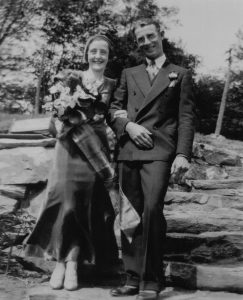 As Henry Jr. grew to manhood, his uncle finally told him the story of his family’s demise when he had graduated from University. Disturbed by the tale, Henry Jr. vowed to go on with his life as a tribute to his lost family. He married and settled in the City of Toronto. Life went on but he found he could not stop thinking about his family lost in Thornhill. After too many sleepless nights, Henry Jr. realized he had to face his fears. He would have to return to Thornhill. He convinced his new wife to return to the land his family had left him but he did not dare tell her what had really happened. Even his beloved Eldora would have refused and called him mad.
As Henry Jr. grew to manhood, his uncle finally told him the story of his family’s demise when he had graduated from University. Disturbed by the tale, Henry Jr. vowed to go on with his life as a tribute to his lost family. He married and settled in the City of Toronto. Life went on but he found he could not stop thinking about his family lost in Thornhill. After too many sleepless nights, Henry Jr. realized he had to face his fears. He would have to return to Thornhill. He convinced his new wife to return to the land his family had left him but he did not dare tell her what had really happened. Even his beloved Eldora would have refused and called him mad.
In 1930, Henry Jr. and Eldora moved to the Thornhill property. Years passed without them ever seeing any ghosts. They had four children who helped tap the maple trees. Business thrived. Over time, Henry Jr. relaxed. The stories were obviously just that, fanciful stories. He enjoyed his calm and peaceful life.
One day, when Henry Jr. was working in town and the children were at school, Eldora was cleaning out one of the back bedroom closets where she made a sinister discovery. She found an old diary with the name George Coffey in it. Eldora read each yellowed page, each horrifying tale of the missing local townsfolk, of the Wallace family that had suffered mental and physical torture from ghosts and demons that haunted this very property. She turned to the final page and read the story about George Coffey being murdered by the angry mob in town. Who had written it into the diary? Who had written the stories about the Wallace family murders if they were already dead?
Clutching the diary, Eldora fled the house and refused to let her family return to it.
Determined no one would ever suffer the same fate, Eldora contacted the local authorities and the Thornhill Historical Board to make them aware of what had happened on the property. She insisted no one ever live there again. In 1950, the property was returned to the City of Thornhill by the Wallace family on the condition it would never be sold. Once the stories became public and were published in local newspapers, everyone in Thornhill stayed clear of the land.
Time passed. The Wallace stories faded from memory. In 1999, a large home developer bought the property from the City of Thornhill. By this time, Henry Jr. and Eldora Wallace had passed away and their children had grown and moved away. The developer tore down the maple trees and what was left of the Wallace family home to build a new family community called the “Thornhill Woods”.
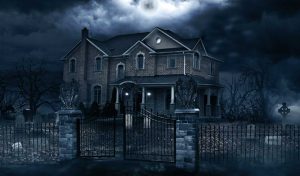 Many families moved into this new development and enjoyed peaceful lives. The neighbourhood was perfect for children. The families enjoyed spacious homes and clear streets. Then one family moved into a special house on the corner. As they unpacked the boxes of their new home, they delighted in its cozy feel. This was truly a house to make a home.
Many families moved into this new development and enjoyed peaceful lives. The neighbourhood was perfect for children. The families enjoyed spacious homes and clear streets. Then one family moved into a special house on the corner. As they unpacked the boxes of their new home, they delighted in its cozy feel. This was truly a house to make a home.
But even on that first night odd things started to happen. Voices whispering around corners. Floors creaked when no one walked on them. The sound of children playing woke them in the middle of the night. At first they shrugged it off. Surely it was only people walking outside with their families. And all new houses needed time to settle. But soon, the new homeowners heard voices coming from the basement, even during the day. When they investigated, no one was there. This continued for weeks, then began to progress. Loud bangs shattered the calm of the night. Doors that were closed whipped opened. Electronic devices turned on by themselves.
Concerned and a little frightened, the family called in a ghost hunter to investigate. The ghost hunters spent weeks researching and were astonished to find more then 28 active spirits residing in the home.
After a further review with the City of Thornhill, the family discovered that their house had been built on the exact location of the demolished Wallace home. Using this information, they checked with the Thornhill Historical Board to see if there was any further information regarding their property. The city clerk handed over a box filled with old property deeds and old land tax receipts, but the most important information was a note book with photos from Eldora Wallace documenting the disturbing events she had learned from George Coffey’s diary. This is how the family has been able to share the detailed stories and nightmarish events regarding George Coffey and the Wallace family.
The Halloween Home Haunt is for outside viewing pleasure only; the family refuses to let anyone enter their home because they are afraid for their safety and most of important of all, for “YOURS”!
NOTE: This legend is a work of fiction!
